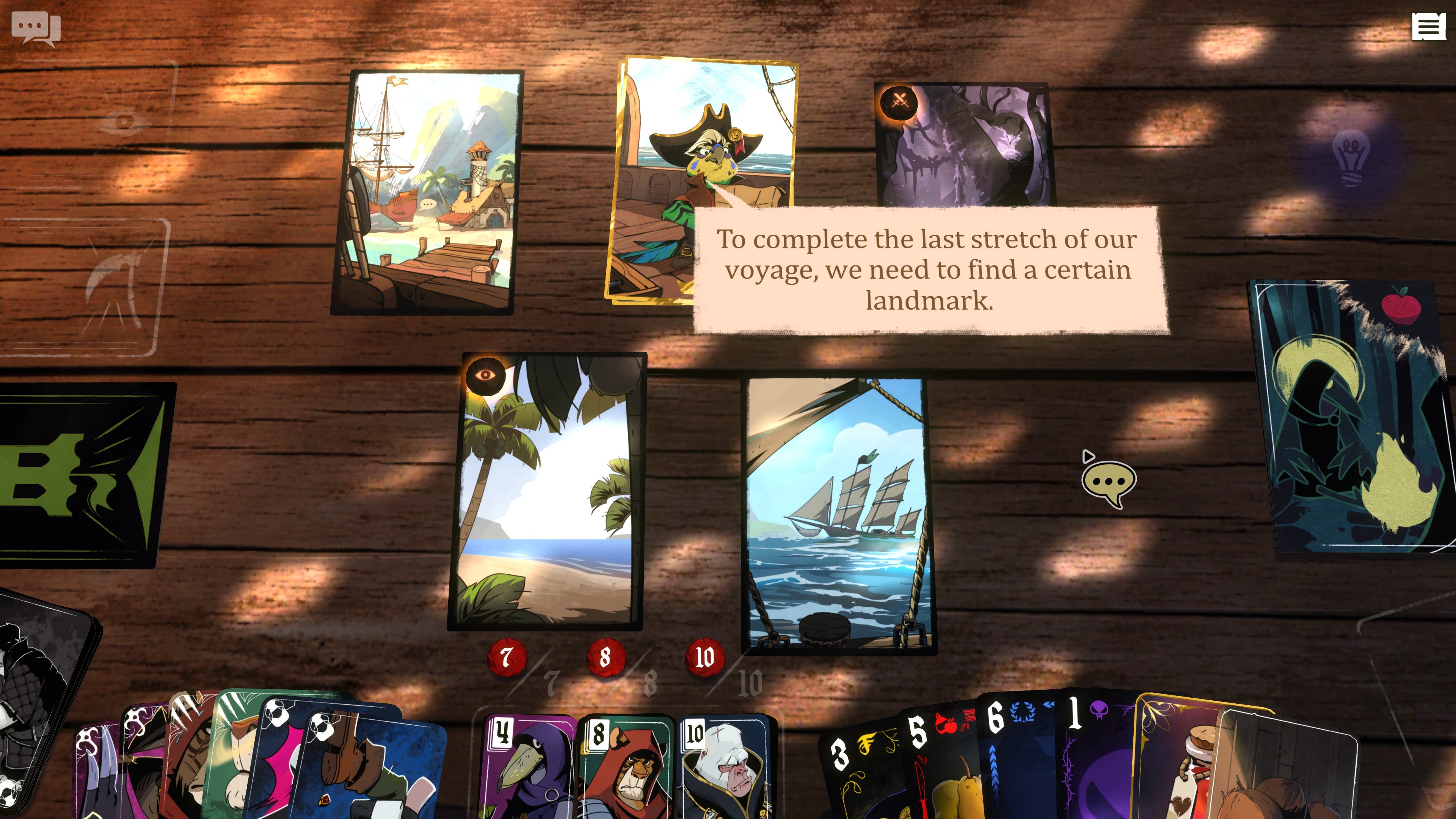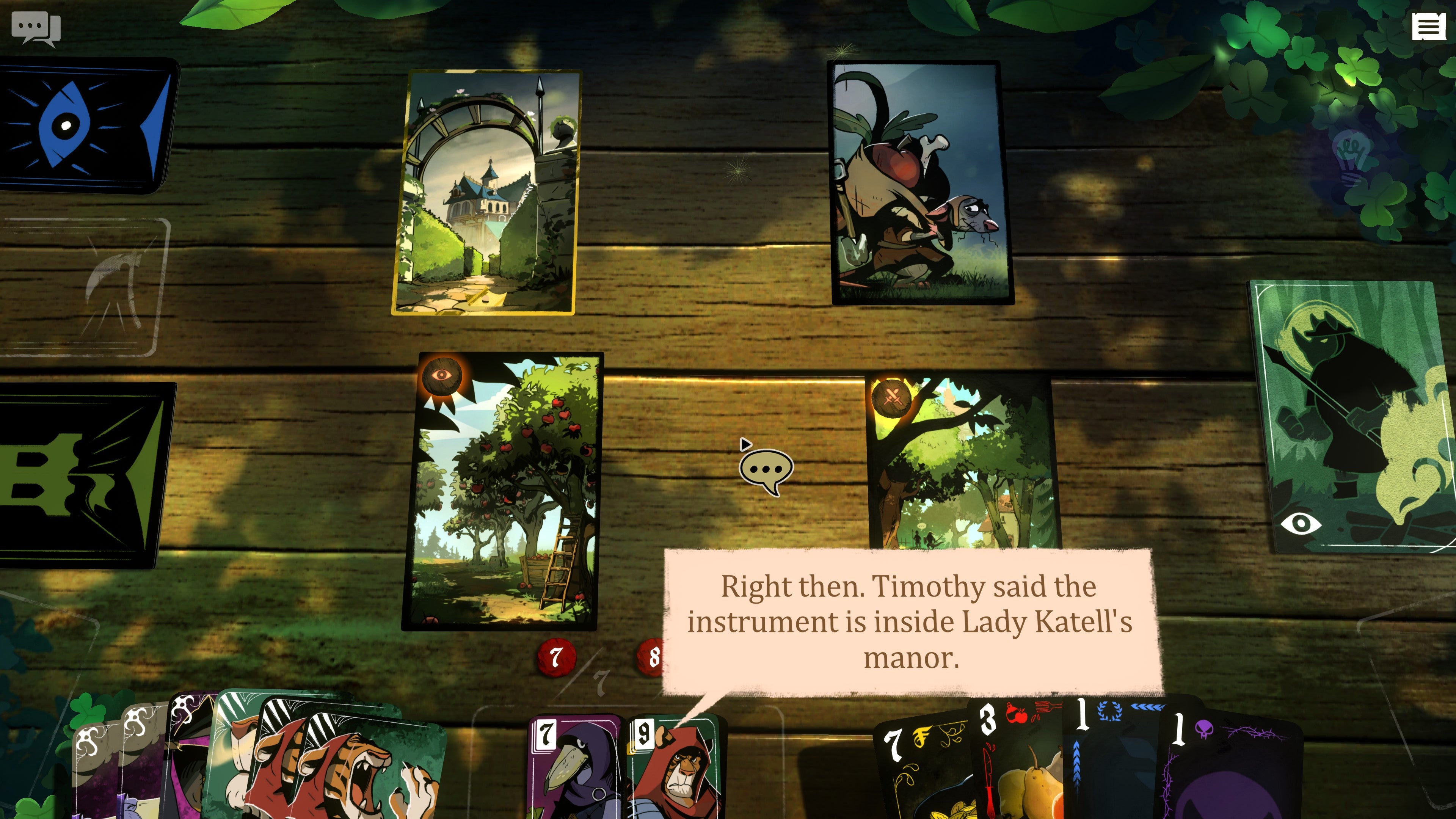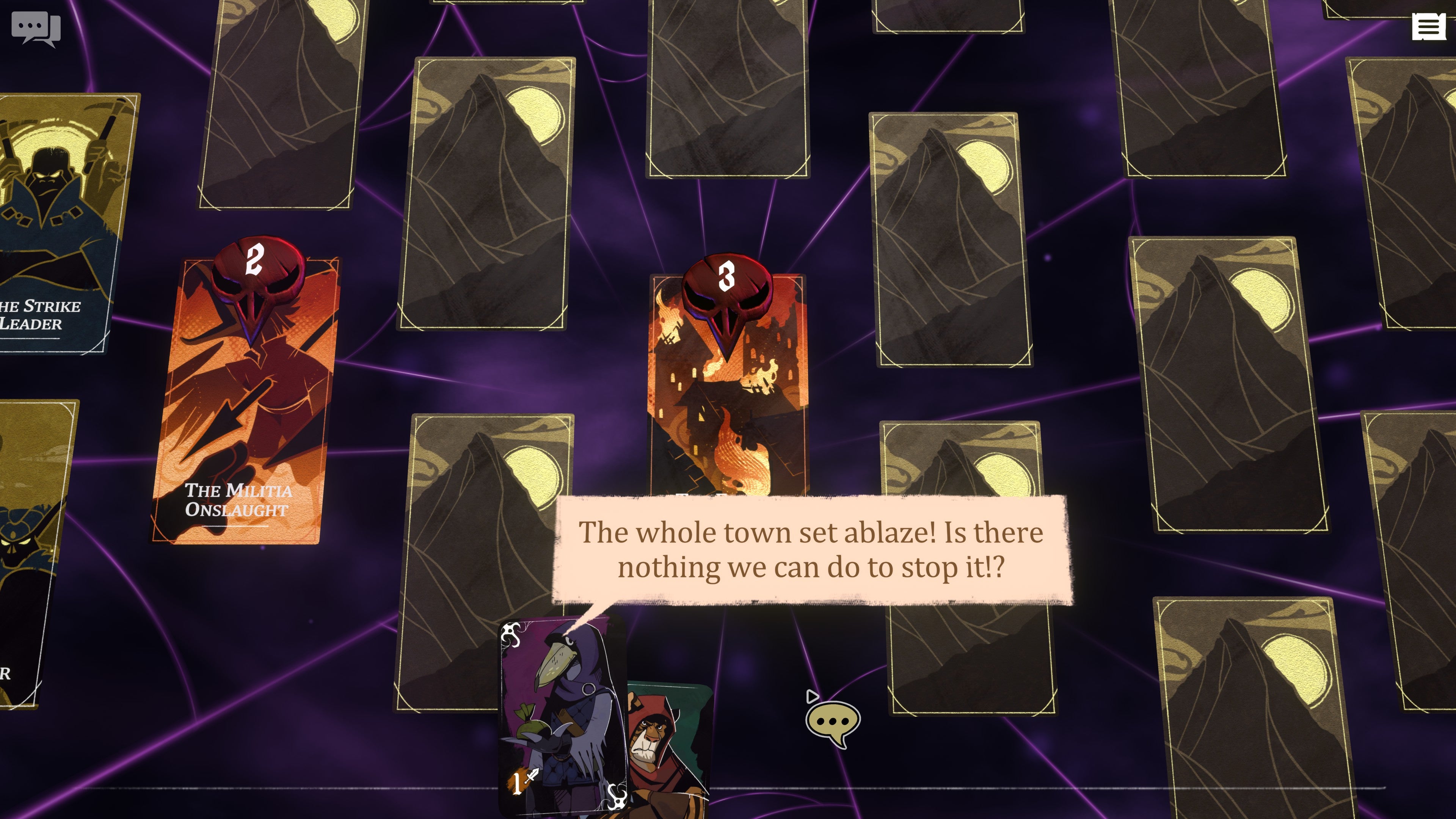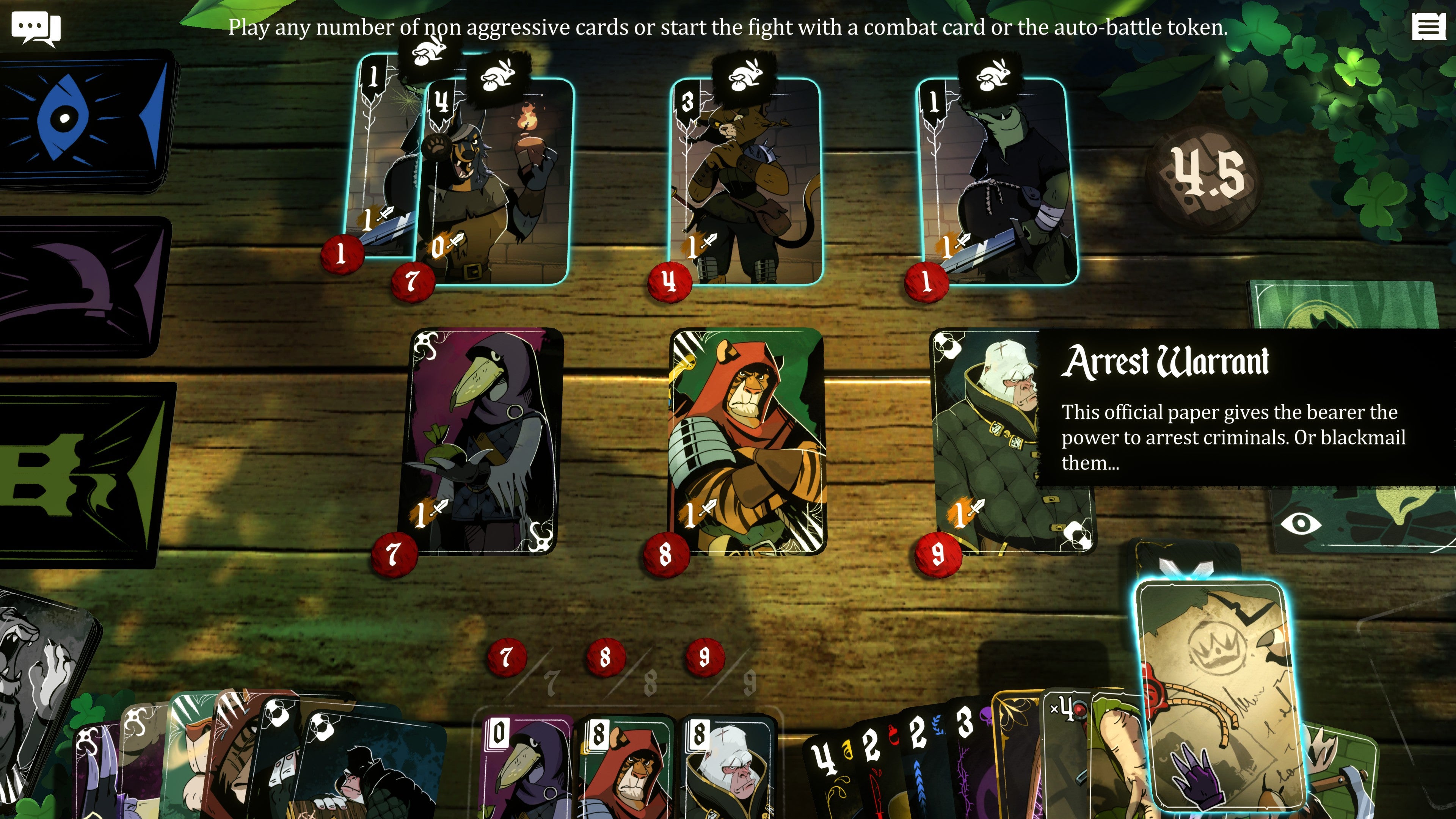Foretales review: channelling Hand Of Fate’s tabletop deckbuilding to great effect
Hand Of Fate was such a singular thing. On the one hand, it was a tabletop deckbuilding game that saw you picking through roguelike-style dungeons by choosing different cards dealt out by its mysterious Dealer. On the other, it was also an action-packed hack and slasher, bringing its fantastical fight sections to life in fully 3D combat arenas – and there hasn’t been anything quite like it since. Voice Of Cards certainly had a go, but its tedious battle system landed it straight on its own discard pile. Thankfully, we’ve now got the infinitely more engaging Foretales, a new narrative card game from French developers Alkemi, and it comes pretty damn close to capturing that Hand Of Fate goodness.
It doesn’t ever venture into the realms of 3D admittedly, erring more toward the Inscryption school of tabletop combat encounters, but it does nail the delivery of telling an artful, swashbuckling adventure through cards and cards alone. And much like Hand Of Fate, this isn’t a one and done affair, either, as there are multiple paths to take through this entertaining fantasy yarn, and several game-changing decisions you’ll have to make as you try and avert a string of terrible visions threatening to destroy its anthropomorphic animal world. You won’t succeed at preventing them all during a single playthrough, but its hard choices only make its overarching story that much more gripping.
You begin your adventure as Volepain, a shoebill thief with a heart of gold. Accompanied by his Little John-esque archer friend Leo (who is, in fact, a tiger), he’s been tasked with stealing a mysterious lyre from the house of a great noble. However, as with all good adventure stories, their prize harbours untold secrets. Specifically, the power to see into the future, which Volepain must decide how to wield, and which lives he’ll be saving in the process. You’re only afforded a set number of ‘turns’, or missions, before each prophetic disaster strikes, meaning some opportunities inevitably fall by the wayside. However, this only makes them that much riper for a second playthrough, as Foretales gets a surprising amount of mileage out of its simple deckbuilding formula.
You see, the whole game plays out in a tabletop tableau, with the cards on the table in front of you representing different locations in your current mission. To progress through its various regions, you’ll need to play certain cards from your party’s respective decks to create effects that advance the story. As a thief, for example, Volepain has a couple of pickpocket cards that can help him lift food and coins from the purses of unsuspecting townsfolk, which you’ll likely need to barter with for other supplies later on. Leo’s heightened sense of smell, meanwhile, means he can usually sniff out the local tavern or berry bush from neighbouring streets and forest pathways to help gather additional resources for your journey. Applying these consumable resource cards to other locations may then open up other new areas, and the cycle begins anew.

Equally, there will be plenty of occasions when the cards in your deck won’t have any effect on the cards currently on the table, and will simply advance you to the next location, drawn from its aptly named and endlessly looping location card pile. You can glimpse what cards are coming up in this pile at any time, and sometimes you do just want to advance to get a certain card on the table, rather than try and hunt down yet another pub or holler for fellow pirates to recruit.

Special shout out to the design of the tabletop itself, with its lighting, sounds and colour palette constantly shifting to reflect the environment depicted in the cards in front of you. Soft, dappled sunlight will stream in through an unseen window when you’re outside in a garden, for example, while gentle rain patter might set in and cast a melancholy hue over the table when you’re in dark, dank caves and sewers. It’s artfully done, and together with its gently looping soundtrack, everything meshes together to paint a convincing picture of the world around you.
The important thing is that Foretales gives you pretty much all the information you need to make informed, logical decisions. Each and every card effect is clearly telegraphed in advance, for example, and you can peek at what’s in your discard pile and remaining party decks to work out whether you fancy trading up a card in your hand at the cost of some food. You can also see how many bandits, watchmen and other ne’er-do-wells are on your tail at any given moment, so you can prepare for the likelihood of a run-in. What’s more, unlike location cards, party cards don’t replenish themselves automatically, so you’ll need to rest every so often to get more of them back in play. Sparingly, though, as resting not only becomes riskier over time, demanding more and more resources, but do it too often and you’ll get a game over.
It’s very puzzle-like in this sense, as it’s all about finding the right card for the job and managing your existing hand to create the desired effect. Despite each mission’s limited number of rest points, I found there was a surprising amount of room for experimentation and trying things out, and even getting a bit lost. Earlier this week, I spent the better part of an hour trying to figure out how to trigger a particular puzzle involving a moth monument and making sure it was on the right side of the table in relation to my ship, and while I came close to using up all my rest points, I still comfortably completed the mission without much worry.

That said, there were moments when Foretales could be a bit better at signalling to players when they’re wholly unequipped to deal with certain missions. There is, thankfully, a hint button that helped put me right on more than one occasion (including the aforementioned moth incident), but there was one instance when I had to ‘read’ a book in a library, but had no idea what cards I needed to play to actually do it. Nothing in my deck seemed to create the right effect, and none of my consumables seemed to work either.
I suspect I needed a certain character I hadn’t met yet, but at no point did the game tell me this, leaving me to endlessly loop round and round until I eventually gave up and returned to the menu screen to tackle something else. Given its whole premise of seeing into the future, I don’t think it would be beyond the realms of plausibility if Volepain also glimpsed that, hey, maybe I’m not properly equipped to deal with this just yet – although I’ll fully admit that it’s also entirely possible I was just completely missing the point and the hint system simply wasn’t detailed enough to nudge me in the right direction. Still, it’s never satisfying having to abandon something you don’t know the answer to, and this was the only point where I felt Foretales let the side down a bit.

Elsewhere, I had a rollicking good time, and I was particularly impressed by how much variety there was in its missions, even when later stages started recycling the same kind of location cards you visited earlier on. Sure, these Herbalist gardens might technically look the same as the ones you skulked through to steal that fateful lyre right back at the start, but now you’re creating situations to dispose of lingering cultists rather than avoiding guards and bribing gardeners to take you through the maze-like hedgerows. There’s also a particularly great second act section where you need to apply torch cards to illuminate a darkened mine as you search for a creature who might just hold the key to the plague-like Beastilence ravaging the land. Even if you come across the cheeky bugger as part of the general location card cycle, he’ll scarper back into its folds unless every other card on the table has been illuminated beforehand. Until that point, I’d only ever focused on one of two cards while ignoring the rest, but this made the whole playing field part of the puzzle – and something an earlier mining mission looking for Volepain’s dad hadn’t really achieved.
My favourite thing about Foretales, though, is the way its turn-based battles emphasise cunning and diplomacy over sheer brute force. Sure, you can slice them up, chuck cannonballs at them and use Volepain’s magic tricks to confuse and disorientate them, but victory is always that much sweeter when you don’t shed a single drop of blood in the process. There are multiple ways to achieve this in Foretales, either by gathering Fame through good deeds, bribing them with food or money or, my favourite, by applying your stash of Grim cards to make them rue the day they ever crossed you – which, yep, you guessed it, are acquired through acts that are significantly less savoury. Actually, scratch that, my actual favourite is showing an arrest warrant card to a band of bandits, which made all of them instantly flee at one point, which made me feel very smug indeed for having yoinked it off a town guard earlier on in the mission. Whatever way you do it, though, it’s all about bringing down the enemy team’s morale until it hits zero, at which point any remaining foes will scarper automatically. And again, you’re given all the information you need to make sound and calculated decisions to spur you on to victory.

It’s just a brilliant meld of strategic card battling, smart puzzles and warm, characterful storytelling. Not only is Foretales constantly adding new riffs and wrinkles to its own cause and effect formula through its growing cast of fuzzballs, but its well-conceived story missions keep you on your toes throughout – as all good card games should. Yes, there are moments when its choose-your-own-adventure foundations can sometimes get the better of you, but for the most part Alkemi have conjured something truly wonderful here. If you’re looking for a narrative deckbuilder to scratch that Hand Of Fate itch, this is one card game that’s definitely earned its seat at the table.
fbq('init', '700623604017080');
fbq('track', 'PageView'); window.facebookPixelsDone = true;
window.dispatchEvent(new Event('BrockmanFacebookPixelsEnabled')); }
window.addEventListener('BrockmanTargetingCookiesAllowed', appendFacebookPixels);

